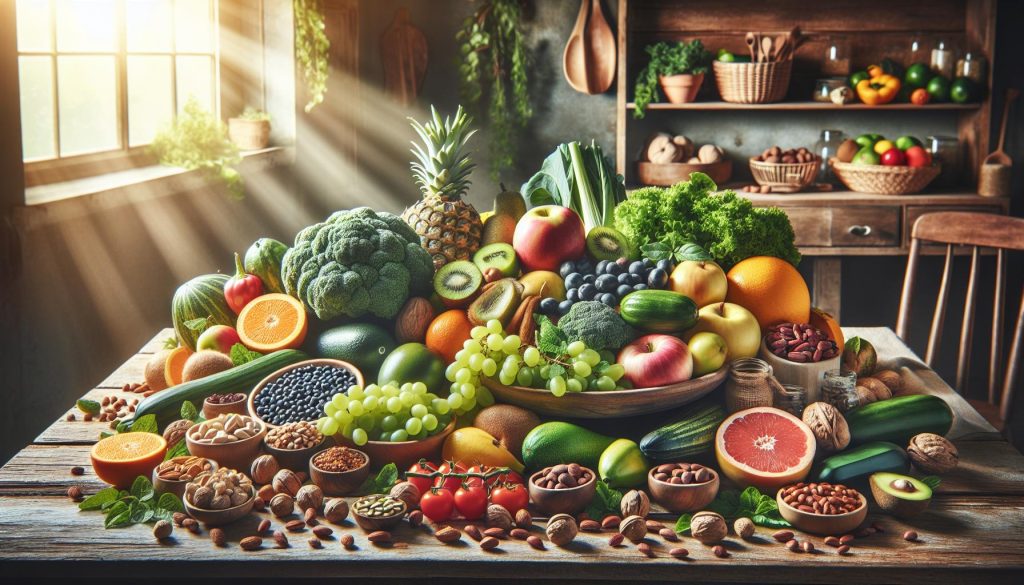
Introducing The Alkaline Diet
In this energizing era of well-being and wellness, you might be asking, “What do you eat on an alkaline diet?” The answer unfolds like a leafy salad; a plethora of fruits and vegetables, nuts, and seeds, all sprinkled with heart-healthy oils. The alkaline diet, all the rage in health-conscious circles, emphasizes fresh produce and plant-based proteins, eliminating processed foods and limiting animal proteins. This colorful and creative cuisine emphasizes mindfulness in dining and focuses on maintaining the body’s pH balance.
The Fundamentals of an Alkaline Diet
Diving into the heart of the matter, the alkaline diet aims to tip your internal pH scale towards the alkaline end. At its core, this diet is about more than losing weight, it’s about promoting longevity and preventing diseases. You’re essentially biting the bullet and bidding au revoir to processed foods and most meats, dairy, and grains, and saying hello to a world bursting with colorful veg, refreshing fruits, and nourishing nuts and seeds.
The Hallmarks of Alkalinity
Peel back the layers of this diet, and you glimpse its vibrant core. Influenced by Mother Nature’s palette, the menu is dominated by plant-based foods, limitlessly leafy greens, bold berries, and wholesome whole grains, embodying the very ethos of the alkaline diet.
Energizing Edibles: Your Alkaline Diet Dos
The diverse world of the alkaline diet offers plenty of options. Leafy greens like spinach, kale, and chard are not just the crown jewels of your salad but also the star players for alkalinity. Other athletes in action are the cruciferous family (think broccoli, cabbage, cauliflower) and root veggies (like sweet potatoes and beets). Round out your edible ensemble with either quinoa or brown rice, and you have a meal fit for any well-being warrior.
Drinks & Snacks: A Walk On The Alkaline Side
Sip on the kinder side of flavors with herbal teas, freshly squeezed fruit juice, and the ever-popular alkaline water. When snack attacks strike, reach for raw almonds or homemade hummus with freshly sliced veggies. A gesture as simple as this keeps the alkaline vibe alive throughout the day.
Steer Clear: The Alkaline Diet Don’ts
Sometimes, living the alkaline life is more about what you don’t eat than what you do. Shun the sinister siblings of salt, sugar, and processed foods. They’re much like a tempest in a teapot - causing unnecessary drama in your body. As a rule of thumb, grains like wheat and rye, dairy products, caffeine, alcohol, and meat all fall in the ‘avoid’ category.
The Alkaline Exception
There’s an underlined exception worth mentioning in the alkaline realm. Lemons, though acidic in their raw state, metabolize into an alkaline ash in your body. So when life gives you lemons, squeeze them into your water for an alkaline-boosting aid.
Wrapping Up The Alkaline Adventure
Embarking on the alkaline diet journey is not about waving a magic wand over your existing diet and poof — you’re alkaline. It’s about making conscious, gradual, and sustainable changes. Implementing an alkaline diet is much like planting a tree. In the beginning, changes are small and almost unnoticeable. But as time passes, growth is undeniable, and the benefits speak for themselves.
Frequently Asked Questions
1. Can I eat dairy products on an alkaline diet?
In the world of alkalinity, dairy products are often given the cold shoulder as they can increase acidity in the body. So, it’s best to limit or avoid them.
2. What fruit can I eat on an alkaline diet?
All fruits are welcomed guests at the alkaline diet banquet. However, melons, bananas, berries, peaches, and avocados deserve an honorable mention.
3. Is coffee allowed on an alkaline diet?
Much like dairy, coffee too falls in the ‘avoid’ category due to its acidic nature. Opt instead for herbal teas or lemon-infused water.
4. Can I eat grains on an alkaline diet?
Yes, but sparingly. Quinoa, millet, and wild rice are acceptable in moderation.
5. Will an alkaline diet help with weight loss?
While weight loss isn’t the primary aim of an alkaline diet, it is a possible byproduct due to the elimination of processed foods and the focus on healthy, whole, plant-based foods.



